What about the millennials and #elxn43?
October 20, 2019
As you’re probably aware, our team spends a lot of time thinking about the impact of generational change on different sectors, the consumer market, labour market, and in public affairs.
There’s been a lot written through Election 43 about the impact that millennials could play in determining the outcome. Those born between 1980 and 2000 will make up the largest segment of the electorate and all millennials will be eligible to vote, for the first time, in this election.
What are Canadian millennials thinking ahead as Election Day approaches? Data from our recent Canadian Millennials Report and polling over the election can shed some light on the priorities of the generation, its mood, how it feels about the leaders, and how millennials intend to vote.
Here is what we found:
Affordability, Affordability, Affordability + Climate Change
To get a sense of the most important issues on the minds of Millennials, we asked our respondents to rank the top five priorities they felt were most important to determining their vote. Two in three ranked the cost of living in their top 5, 11-points higher than those in older generations.
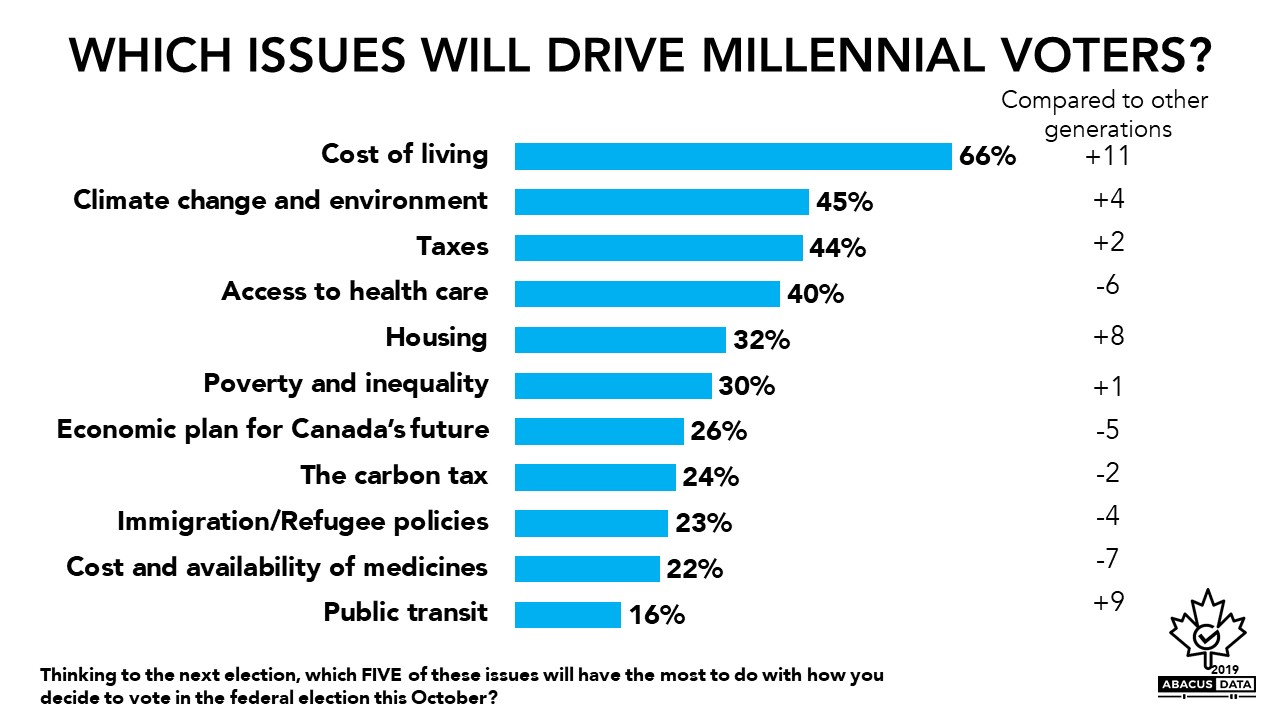
Climate change and the environment, taxes, access to health care, and housing rounded out to the top 5. Millennials are 4-points more likely to rank climate change, 8-points more likely to rank housing, and 9-points more likely to rank public transit as a top issue than older generations.
On the issue of affordability, when we ask which party they think will make their life more affordable, 25% selected the Liberals, followed by the NDP and Conservatives at 21% respectively. 4% picked the Greens, BQ, and People’s Party while 20% were unsure.
Housing has also been a source of great concern for younger Canadians. In research we did for the Canadian Real Estate Association a year ago, the dream of owning a home was strong among millennials who didn’t currently own or rent their home.
“Doing Enough” on Climate Change?
In addition to housing, a political issue of particularly high importance to young Canadians is climate change. Although a significant proportion of respondents (38%) included taking action on climate change on their top list of government priorities in our Millennials Report study, what’s even more notable is that this issue was the most likely to be Millennials’ #1 priority (13%), even beating out housing (12%). Moreover, when asked about how they felt about the environment, only 13% said they identified as someone who didn’t “really care too much”. This exemplifies an important insight: climate change is not just something of interest to Millennial voters- rather, it is most likely to be utterly top of mind.
Since the early summer, when data above was collected, climate change has seemed to only gain further prominence in public discourse, with hundreds of thousands of Canadians participating in climate strikes just last month. Similarly, the environment has been a consistent topic throughout the campaigning, figuring centrally during many debates and interviews. Some may hope to capitalize on the level of dissatisfaction with existing efforts on the environment. Millennial dissatisfaction with existing efforts on the environment might be a contributing factor to why so many parties are putting this issue in their crosshairs.
As an example. Millennials are 8-points more likely to support the federal carbon tax than those from older generations (55% vs. 47%).
As Millennials continue to hold an increasingly influential role in the Canadian political landscape, so too can we expect the issue of the environment to grow in importance.
Indeed, the majority of young Canadians we studied felt that their generation cared more about climate change compared to older Canadians. While the environment may have simply been one of a number of prominent issues areas in this election, the overall trend seems to indicate that climate change could come to define a future political contest.
Pessimism, Hope, and the Future
While key issues like climate change and housing are doubtless on the minds of millennials in the week before election day, so too are some higher-order principles.
When we asked millennials a more abstract question like “is Canada headed in the right direction?”, respondents were divided. 41% felt Canada is headed in the right direction, while 38% felt the country was off on the wrong track.
Similarly, when asked about Canada’s future, the number of Millennials that felt mostly or very optimistic has dropped from 63% in January 2018 to 47% in June of this year.
Our data suggest that millennials heading into this year’s federal election were feeling less confident and hopeful about Canada. Something that may impact their vote choice.
Millennial Views on #Elxn43
Despite the overall generational trends identified above, the views of Millennials on the federal campaign are far from uniform.
When asked for their impressions of the slate of federal leaders, young Canadians reported a diverse set of views. The most popular leader is NDP leader Jagmeet Singh who had both the highest percentage of positive impressions at 47% and the lowest percentage of negative impressions at 18% Singh’s image improved markedly after this performance in the English language debate.
Singh’s popularity makes a sharp comparison to Conservative leader Andrew Scheer (incidentally the youngest of the federal leaders), who evoked the highest number of negative impressions amongst millennials at 48%. Scheer’s positive impressions were the second-lowest of the federal leaders at 23%, outstripped only by Maxime Bernier of the People’s Party at 13% positive.
For Mr. Trudeau, millennials pose both an opportunity and a challenge. They were critical to his success in 2015 and will be important if the Liberals hope to be re-elected again tomorrow. 41% of millennials have a positive impression of Mr. Trudeau compared with 37% who view him negatively.
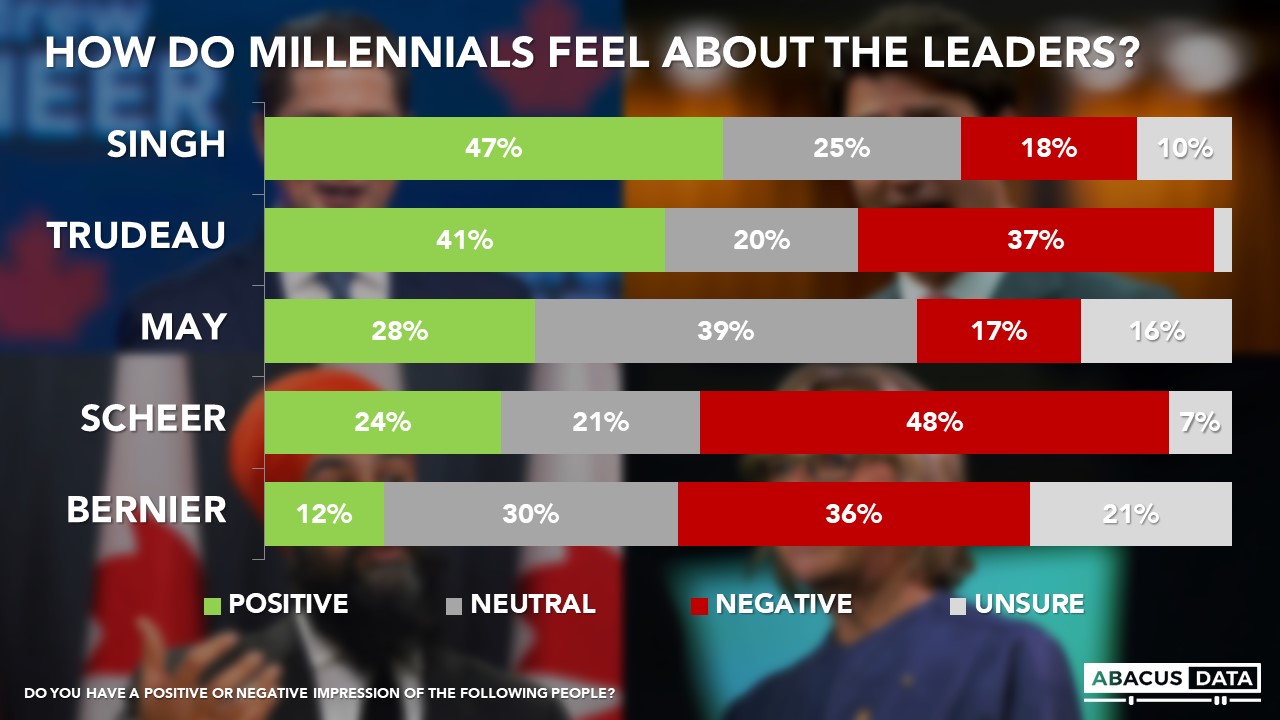
How will Millennials Vote?
Our latest suggests that more of those aged 19 to 39 will vote Liberal than any other party. The Liberals will get 34% of the millennial vote compared with 25% for the Conservatives, 23% for the NDP, and 10% for the Greens.
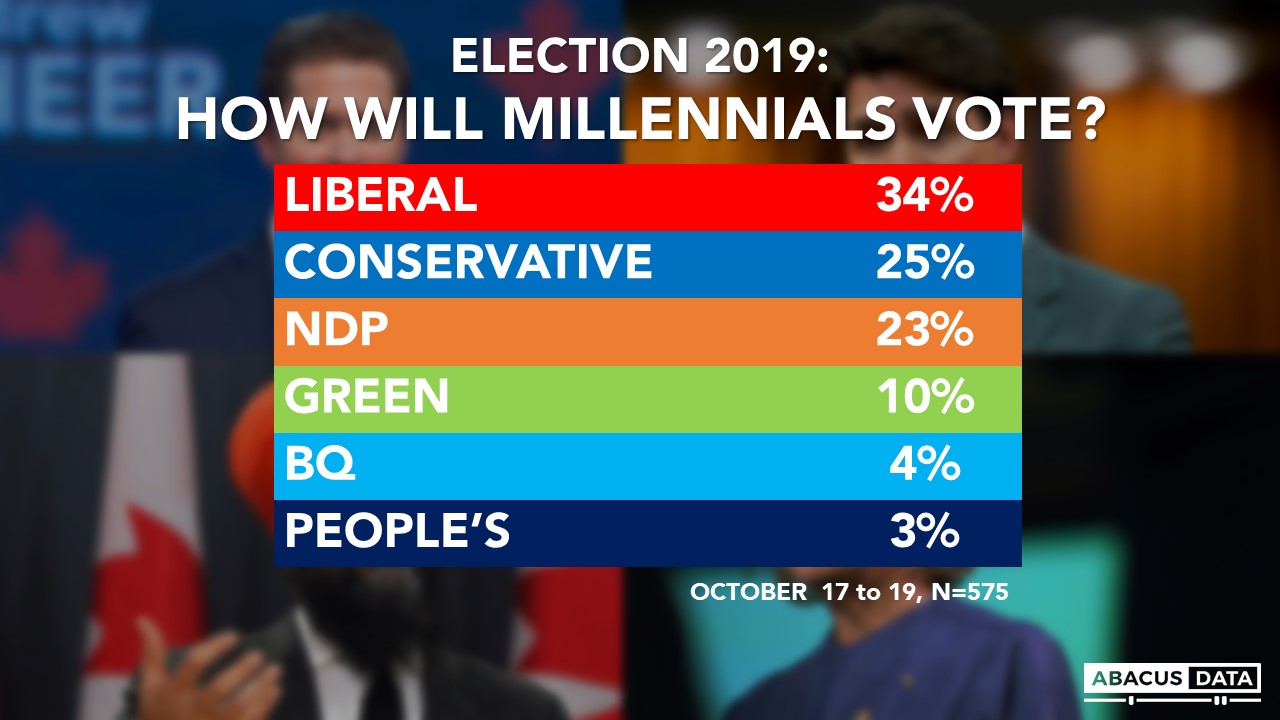
In Quebec, where the BQ has soared over the past few weeks, the Liberals are poised to get 43% of the millennial vote versus 20% for the BQ, 12% for the Greens, 10% for the Conservatives, and 9% for the NDP.
This 9-point lead for the Liberals is substantial and underscores the weakness of the Conservative Party among the largest generational cohort in the electorate. But it is also a step back for the Liberals who, according to our research in 2015, received 44% of the millennial vote in the last federal election compared with 24% for the NDP, 21% for the Conservatives, and 6% for the Greens.
We also find a difference in party support by gender. Millennial women are 9-points more likely to say they will vote NDP than millennial men. They are also 5-points likely to vote Conservative whereas millennial men are 7-points more likely to vote Green and 5-points more likely to vote for the People’s Party. We find no difference in Liberal Party support between millennial men and women.
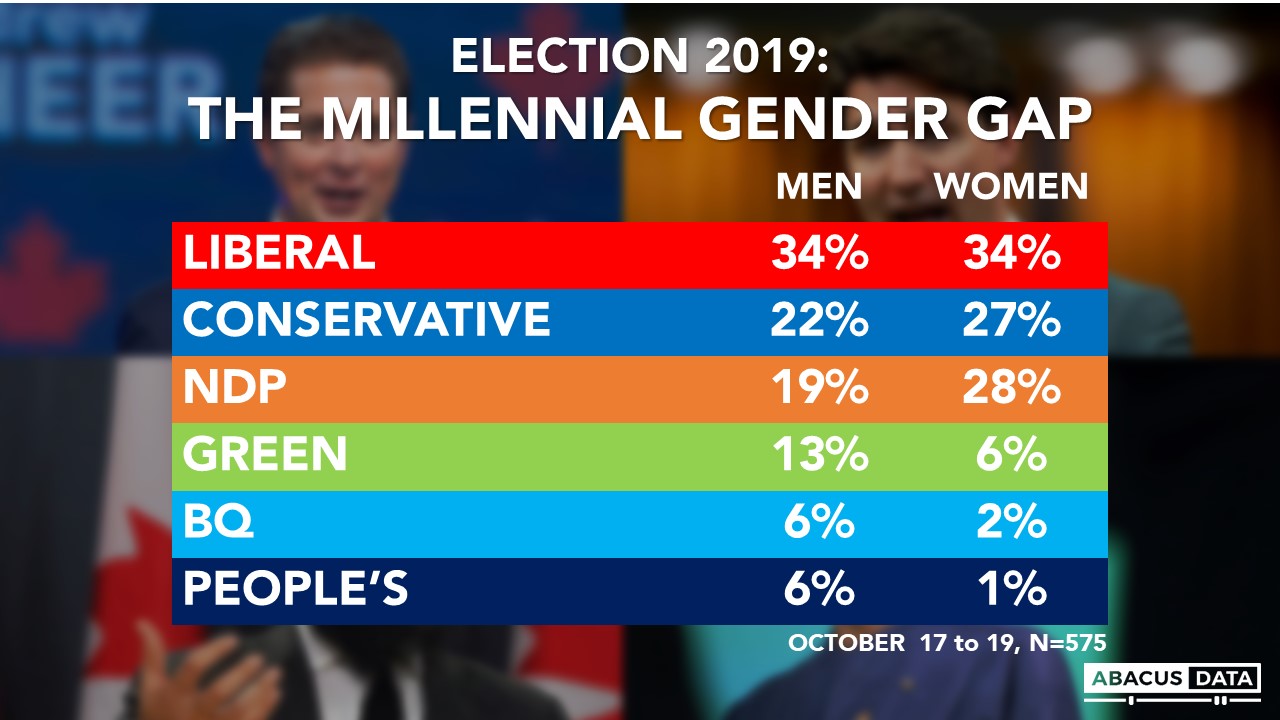
Who would millennials prefer to be Prime Minister after the election? 38% want Mr. Trudeau followed by 26% for Mr. Singh and 24% for Mr. Scheer. 8% selected Ms. May.
Will they vote?
Throughout the campaign, the question we are asked the most is, will millennials vote this time? In 2015, youth voter turnout spiked by 15-points over the previous election.
Predicting turnout is very difficult but evidence from our final campaign survey suggests millennials say they are less likely to vote than other generations but whether turnout matches 2015 is hard to predict at this stage. If millennials are going to have a big influence on the outcome, they will need to turnout.
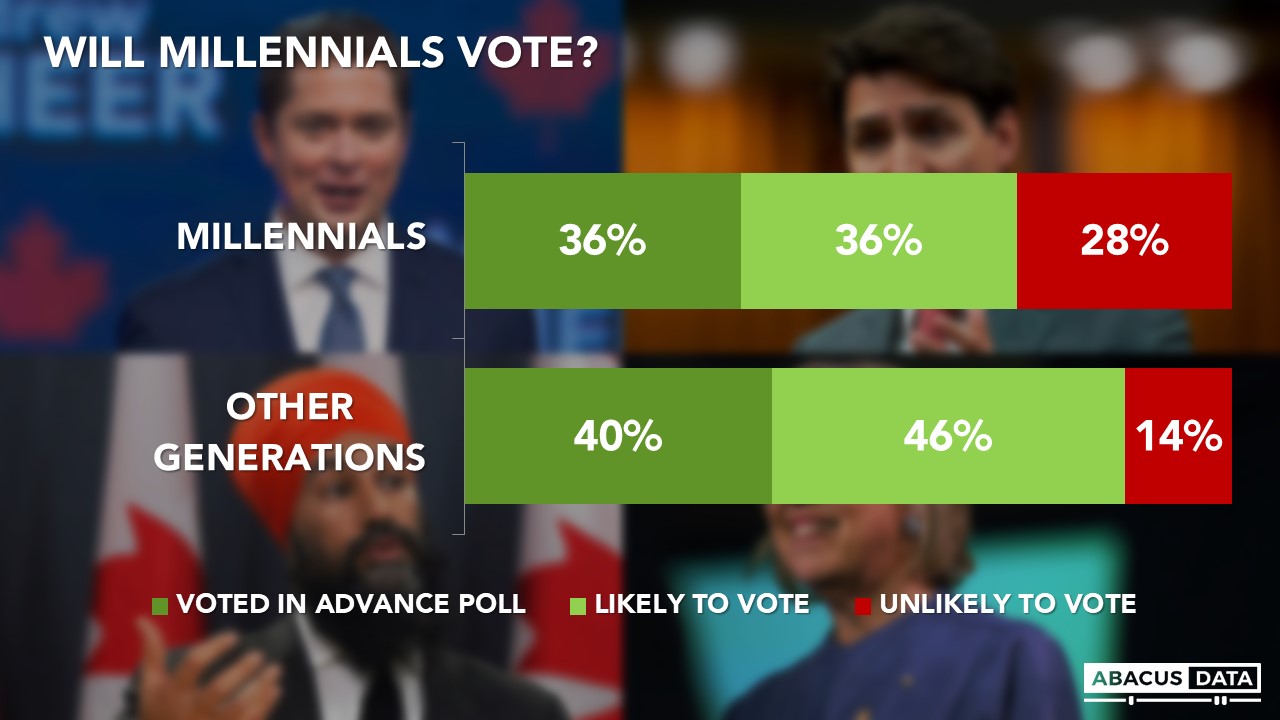
Inside the Mind of the Potential Millennial Voter
Though some might be tempted otherwise, the motivations of Millennials voters cannot be boiled down to the legalization of marijuana or the appeal of an Instagram follow from Drake.
The Millennial cohort itself is fractured and prone to an incredible diversity of thoughts and experiences, as evidenced by the high degree of heterogeneity displayed by respondents under 40 in our latest polling numbers.
Millennial Canadians are motivated by a complex and multi-dimensional set of factors. Many of the issues that drive young voters are shared across generations, like concern for the healthcare system or the need for a strong economy. However, our data suggest that there are a number of issues that Millennials are particularly or uniquely concerned with.
Affordability, particularly housing, seemed to preoccupy the largest number of the young Canadians we studied, the majority of whom felt that things haven’t gotten much better over the past four years.
Moreover, climate change continues to capture the attention of the young voters, who felt that their generation cared more than those older than them. Dissatisfaction with progress to date, the threat of a climate crisis, and a sense that economic gains do not benefit them are just some of the drivers of a general trend we observed of a steady decrease of optimism in Canada’s direction and future.
We anticipate this cocktail of strong factors, plus a twist of the unexpected, will shape the minds of Millennial voters as they step into the polling booth tomorrow.
METHODOLOGY
Our survey was conducted online with 2,000 Canadians aged 18 and over from October 17 to 19, 2019. A random sample of panellists was invited to complete the survey from a set of partner panels based on the Lucid exchange platform. These partners are double opt-in survey panels, blended to manage out potential skews in the data from a single source.
The margin of error for a comparable probability-based random sample of the same size is +/- 2.1%, 19 times out of 20. The data were weighted according to census data to ensure that the sample matched Canada’s population according to age, gender, educational attainment, and region. Totals may not add up to 100 due to rounding.
ABOUT ABACUS DATA
We are the only research and strategy firm that helps organizations respond to the disruptive risks and opportunities in a world where demographics and technology are changing more quickly than ever.
We are an innovative, fast-growing public opinion and marketing research consultancy. We use the latest technology, sound science, and deep experience to generate top-flight research-based advice to our clients. We offer global research capacity with a strong focus on customer service, attention to detail and exceptional value.
Contact us with any questions.
Find out more about how we can help your organization by downloading our corporate profile and service offering.




